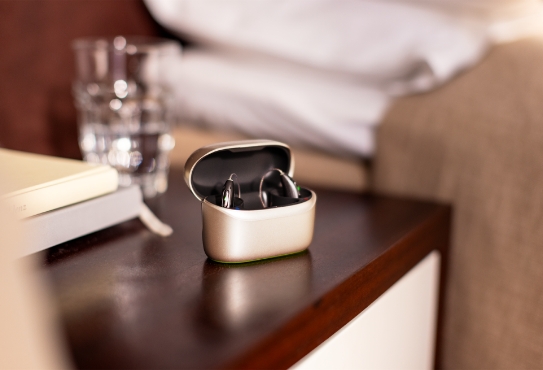We offer hearing services for all ages
We can help you get connected
with your world.
Hearing Tests
There are several other types of tests available, each dedicated to revealing a certain aspect of your hearing health. We’ll examine your overall symptoms and determine which hearing tests best meet your needs.
Another hearing test used primarily for infants and young children (typically 6 months to 2.5 years old) who cannot yet respond verbally or with motor tasks in traditional audiometry.
VRA is a method used to assess a child’s hearing by associating a sound with a visual reward, making the test engaging and effective for young children.
Children under 5 years old may have difficulty participating in traditional audiometry because they lack the language or motor skills to respond appropriately.
In CPA, the child is trained to associate a sound with a fun, simple task. For example, the child might be asked to put a block in a bucket, stack a ring on a peg, or place a toy in a box whenever they hear a sound.
Audiometry typically involves presenting sounds at various frequencies and volumes to determine how well an individual can hear. The test is often conducted in a soundproof room using headphones or ear inserts, and it is non-invasive, safe, and painless.
The results are plotted on an audiogram, a chart that shows the softest sound the person can hear at each frequency. The audiogram helps determine if the person has normal hearing or hearing loss, and if so, its type (sensorineural, conductive, or mixed) and severity.
Get your life ahead.
At Hear North Audiology we’re committed to helping our clients restore their hearing and improve their quality of life.
Earwax Management
Earwax management by an audiologist is a safe and effective way to address earwax-related issues, including hearing loss, and discomfort.
Through professional inspection and appropriate removal techniques such as ear drops, manual removal, or irrigation, audiologists can ensure that your ears stay clean and healthy without risking injury. If you suspect earwax buildup, or if you’re unsure about how to care for your ears, it’s always a good idea to seek professional advice from an audiologist.


Custom Earplugs
Custom earplugs are specialized ear protection devices designed to fit the unique shape of your ear, offering superior comfort, sound attenuation, and protection compared to over-the-counter (OTC) earplugs.
Made from soft, flexible materials like silicone or acrylic, custom earplugs are molded specifically to the shape of your ear canal by an audiologist or hearing healthcare professional. They provide personalized, long-lasting protection for individuals exposed to loud environments or those with specific hearing needs.
Hearing Aid Repair
Hearing aids can require repair due to a variety of issues, from simple battery problems to more complex issues like moisture damage or physical wear. Regular maintenance, cleaning, and proper care can help extend the life of your hearing aids and reduce the likelihood of needing repairs.
If you encounter any problems with your hearing aids, don’t hesitate to call us, we can diagnose and repair your hearing aids or recommend the best next steps. Regular checkups and maintenance can ensure that your hearing aids continue to provide you with the clear, comfortable hearing you need.


Hearing Aid Services
A hearing aid consultation and fitting process is a comprehensive journey designed to ensure individuals receive the best possible hearing experience tailored to their specific needs.
Whether you’re a first-time user or someone who has worn hearing aids for years, working with us through each of these stages is crucial for achieving optimal hearing aid performance.

Why Are Hearing Aid Fittings
Important?
A proper fitting is vital for successful treatment for hearing loss. When you undergo a fitting, you help to ensure the proper function of your hearing aids, making you more likely to reap the benefits of wearing hearing aids.
Hearing aid fittings are important because:
Uncomfortable hearing aids are rarely used
When a pair of hearing aids fail to sit in the ear comfortably, it becomes far too easy to dismiss them as “ineffective.” In this way, hearing aids that are properly fit help those with hearing loss enjoy effective treatment.
Improper calibration can cause discomfort
A hearing aid set too loud can damage your hearing and cause discomfort, while one that’s too quiet is ineffective. Both can lead to disuse, risking your long-term hearing health.
Some advanced functions need to be set up properly
We understand hearing aids and can help customize settings for your daily needs, as well as sync them with your phone or TV—enhancing your quality of life and maximizing their benefits.